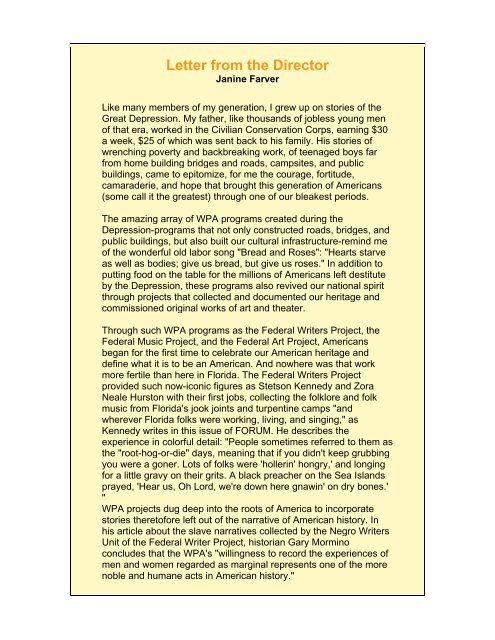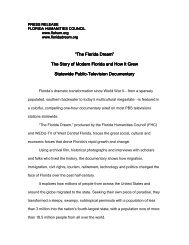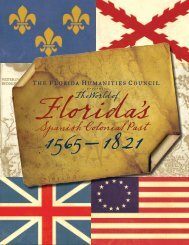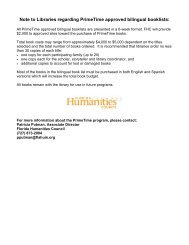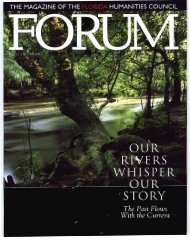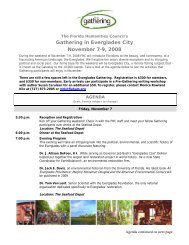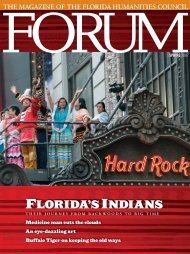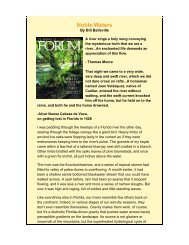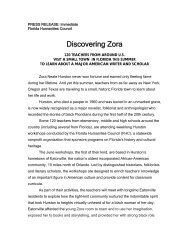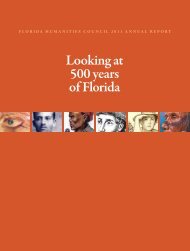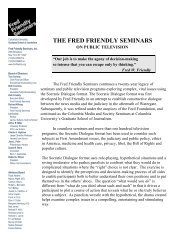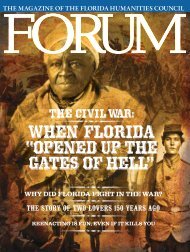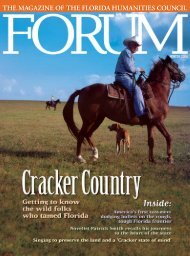Letter from the Director - Florida Humanities Council
Letter from the Director - Florida Humanities Council
Letter from the Director - Florida Humanities Council
Create successful ePaper yourself
Turn your PDF publications into a flip-book with our unique Google optimized e-Paper software.
<strong>Letter</strong> <strong>from</strong> <strong>the</strong> <strong>Director</strong><br />
Janine Farver<br />
Like many members of my generation, I grew up on stories of <strong>the</strong><br />
Great Depression. My fa<strong>the</strong>r, like thousands of jobless young men<br />
of that era, worked in <strong>the</strong> Civilian Conservation Corps, earning $30<br />
a week, $25 of which was sent back to his family. His stories of<br />
wrenching poverty and backbreaking work, of teenaged boys far<br />
<strong>from</strong> home building bridges and roads, campsites, and public<br />
buildings, came to epitomize, for me <strong>the</strong> courage, fortitude,<br />
camaraderie, and hope that brought this generation of Americans<br />
(some call it <strong>the</strong> greatest) through one of our bleakest periods.<br />
The amazing array of WPA programs created during <strong>the</strong><br />
Depression-programs that not only constructed roads, bridges, and<br />
public buildings, but also built our cultural infrastructure-remind me<br />
of <strong>the</strong> wonderful old labor song "Bread and Roses": "Hearts starve<br />
as well as bodies; give us bread, but give us roses." In addition to<br />
putting food on <strong>the</strong> table for <strong>the</strong> millions of Americans left destitute<br />
by <strong>the</strong> Depression, <strong>the</strong>se programs also revived our national spirit<br />
through projects that collected and documented our heritage and<br />
commissioned original works of art and <strong>the</strong>ater.<br />
Through such WPA programs as <strong>the</strong> Federal Writers Project, <strong>the</strong><br />
Federal Music Project, and <strong>the</strong> Federal Art Project, Americans<br />
began for <strong>the</strong> first time to celebrate our American heritage and<br />
define what it is to be an American. And nowhere was that work<br />
more fertile than here in <strong>Florida</strong>. The Federal Writers Project<br />
provided such now-iconic figures as Stetson Kennedy and Zora<br />
Neale Hurston with <strong>the</strong>ir first jobs, collecting <strong>the</strong> folklore and folk<br />
music <strong>from</strong> <strong>Florida</strong>'s jook joints and turpentine camps "and<br />
wherever <strong>Florida</strong> folks were working, living, and singing," as<br />
Kennedy writes in this issue of FORUM. He describes <strong>the</strong><br />
experience in colorful detail: "People sometimes referred to <strong>the</strong>m as<br />
<strong>the</strong> "root-hog-or-die" days, meaning that if you didn't keep grubbing<br />
you were a goner. Lots of folks were 'hollerin' hongry,' and longing<br />
for a little gravy on <strong>the</strong>ir grits. A black preacher on <strong>the</strong> Sea Islands<br />
prayed, 'Hear us, Oh Lord, we're down here gnawin' on dry bones.'<br />
"<br />
WPA projects dug deep into <strong>the</strong> roots of America to incorporate<br />
stories <strong>the</strong>retofore left out of <strong>the</strong> narrative of American history. In<br />
his article about <strong>the</strong> slave narratives collected by <strong>the</strong> Negro Writers<br />
Unit of <strong>the</strong> Federal Writer Project, historian Gary Mormino<br />
concludes that <strong>the</strong> WPA's "willingness to record <strong>the</strong> experiences of<br />
men and women regarded as marginal represents one of <strong>the</strong> more<br />
noble and humane acts in American history."
While at times controversial, <strong>the</strong> scores of WPA-commissioned<br />
murals across our state "remain as <strong>the</strong> legacy of a social revolution<br />
that was America's response to <strong>the</strong> specter of economic disaster,"<br />
writes art historian Mallory O'Connor. "...The New Deal art projects<br />
were <strong>the</strong> first to focus on explorers, Indians, settlers, farmers,<br />
fishermen, teachers, and businessmen-in short, <strong>the</strong> men, women,<br />
and children who were <strong>the</strong> unsung heroes of everyday life."<br />
In many ways <strong>the</strong> <strong>Florida</strong> <strong>Humanities</strong> <strong>Council</strong> carries on <strong>the</strong> work<br />
and traditions of those WPA programs. By providing writers,<br />
historians, and artists with grants to document and examine our<br />
history and heritage, by sending humanities speakers to<br />
communities across <strong>the</strong> state, by publishing <strong>the</strong> magazine that<br />
explores <strong>the</strong> culture of <strong>Florida</strong>, FHC continues to weave new stories<br />
into <strong>the</strong> fabric of our state's collective memory, stories that define<br />
what it is to be a Floridian.<br />
-Janine Farver


